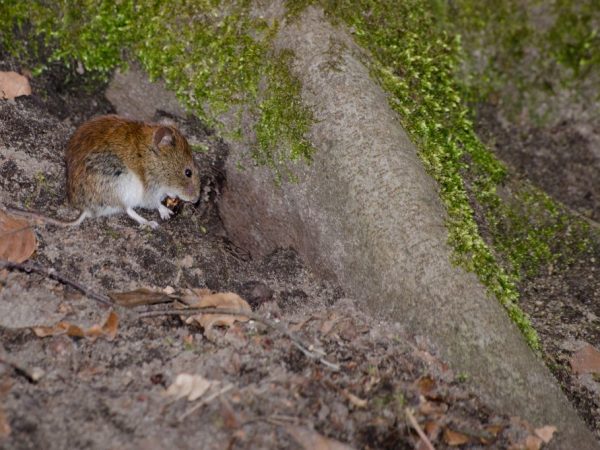What to do if mice gnaw grapes
The fight against rodents remains an urgent problem, since they can significantly harm the vineyards. If the mice gnaw on the grapes, it can kill them, so you need to know how to protect the tree.

Mice gnaw grapes
Mechanical barriers
To protect the grapes from mice in winter, so that they do not eat the bark, you can use mechanical barriers. Use ordinary plastic wrap to wrap the vine. To improve protection, dig narrow trenches up to 80 cm wide and line the bottom with spruce needles, reeds, twigs or black roots, the smell of which is unpleasant for rodents.
The vine can also be saved by planting dandelions around the perimeter of the vineyard.
Sometimes bottles are used for protection. A five-liter plastic bottle with the neck cut off earlier is dug into the ground between the vines. At the same time, when using a glass bottle, a little sunflower oil should be added to it.
An effective protection of the grape crop from stubborn rodents is to dig in the vine under the ground. But if for some reason it does not work out, the cultures are wrapped up until winter.
Chemical substances
It is possible to protect grapes from mice by chemical means, they will rid the vineyards of rodents and will not harm the bushes.
Poisons
Popular are Brodifacum, Difenacin, OtRats, Rat Death, Pied Piper, Zoocoumarin and Flocumafen. Their main substance - rodenticide - has a significant effect on blood clotting in a rodent. Death occurs in a few days.
Mice eat these foods for the reason that they contain flour, a variety of oils and flavors. The poisoned drug is placed directly under the vines to be eaten.
Repulsive fragrances

The smell of burnt rubber keeps mice away all year round
Mice are sensitive to odors. The following odors frighten off rodents: Vishnevsky ointment, "Zvezdochka", tar, liquid smoke, essential oils, kerosene and naphthalene. Sawdust or pieces of cloth are impregnated with these substances and placed near the vine. Lime with odorous inclusions is also a good protection of grapes from mice; bushes should be treated with it.
Although rodents do not tolerate the smell of black root, they use elderberry, mint, coriander, tansy, wild rosemary, wormwood, etc. as its analogues, planting them along the perimeter of the vineyards. But the smell of burnt rubber will help protect grapes from mice in summer and winter, unlike plants that bloom only seasonally.
Use of predators
Cats and dogs destroy rodent nests not only in the process of hunting, but also, leaving excrement on the site, which can also have a deterrent effect on mice.
This is a good way to protect yourself. But there are also disadvantages:
- when sheltering grape bushes, you still need to leave passages for the animal, which in itself violates the idea of \ u200b \ u200bthe shelter;
- the pet is trained to protect the vine, which is also difficult;
- nutrition is problematic because pets cannot eat only mice.
Frequent mistakes of the owners
Do not insulate grape bushes with fallen leaves or straw, because in such conditions there is a greater chance that mice will damage the grapes.
If a pet still lives on the site, then chemical remedies cannot be used so that the pet does not eat it and does not get poisoned.
The garden plot is regularly cleaned of debris and dry leaf cover, because mice also like to winter in such shelters, and then the owner of the summer cottage will not notice how the mice have already gnawed on the vine.
Conclusion
Now you know how to keep mice out of grapes in winter. To prevent mice from eating the bark and other parts of the plant, the methods are often combined.


